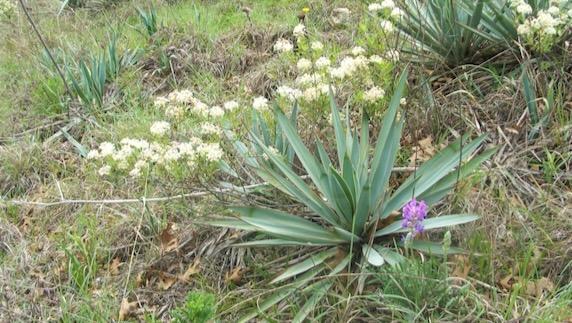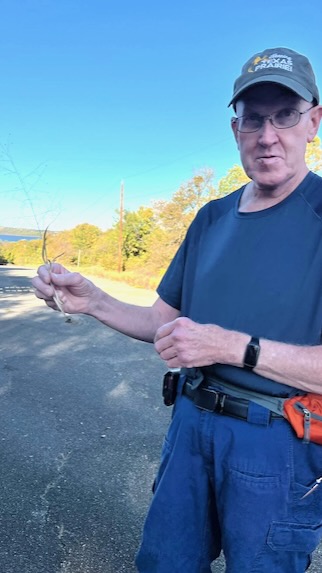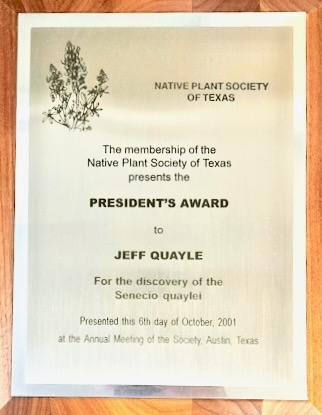
The GoFundMe project launched by Fort Worth Master Naturalist Jeff Quayle aims to expand native plant selection in the nursery trade. Coutesy of Jeff Quayle.
When Fort Worth resident Jeff Quayle posted his GoFundMe campaign in July asking for support for his latest botanical project, he wasn't sure if it would take root.
Within two weeks, he had raised more than $3,000 from donors eager to support his mission — collecting seeds from rare and uncommon native Texas plants and introducing them into the commercial nursery trade.
The campaign funds Quayle's work as a research associate with the Botanical Research Institute of Texas (BRIT) in an unpaid position that requires significant personal investment. The donations therefore help reimburse him for mileage and expenses as he travels across North Texas collecting plant specimens and gathering seeds for BRIT's herbarium and seed bank.
Additionally, he collects viable material and seeds for the propagation of trees, bushes, grasses and wildflowers that have largely been overlooked as landscaping options.

“I’m focusing on the uncommon and rare species that aren’t in the nursery trade,” he says. “The goal is not just to preserve these species, but to introduce them into nurseries so more people can use them in home gardens and landscaping.”
He's already collected seeds from more than 40 species, including bush sunflower, lemonscent, and several lesser-known varieties of gay feather — plants native to Texas but nearly impossible for homeowners to get their hands on. One species that he has collected is in fact new to science and therefore now bears his name: Quayle's Ragwort, a species of aster.
Quayle’s idea for the crowdfunding campaign came from a friend who had successfully used a similar platform to fund research on rare species in the Piney Woods and Post Oak Savannah regions. He says the support he’s received, both monetary and moral, has been encouraging.
"I think it's because there's been a push in recent years for people to want to go the native landscaping route," he says. "There's so much demand for it and there's not enough material out there."
A COLLABORATIVE APPROACH TO GROWING RARE SPECIES
To make the commercialization of more native species successful, Quayle has begun building a partnership that currently relies on the Texas Conservation Alliance’s native plant propagation collaboration with the Dallas Zoo for seed germination and growing the plants, and EcoBlossom Nursery in Fort Worth as a retail solution for selling the plants. These partners, along with a colleague with the Tarrant County College Northwest campus greenhouse, are also filling in the gaps in areas of plant propagation that Quayle admits are outside his forte.
"I'm fairly new to the growing of native plants," he says. "A lot of it is trial and error, learning how to grow from seed."
BEYOND PRETTY LANDSCAPES

The project's ultimate aim extends beyond aesthetics, Quayle says. Native plants, unlike exotic species, provide crucial support for pollinators and wildlife. Additionally, they're drought-tolerant, require no pesticides, don’t rely on fertilizers and are low-maintenance and light on resource consumption.
"The more species we can get out into the nursery trade, the better it's going to be to support the insects and the pollinators," Quayle says. “You don't even necessarily have to own a house to make an impact — if you don't have much space in an apartment, you can still do container gardening and provide a source of nectar.”
Ultimately, his plan is that these native species will be propagated and made ready for transplanting by numerous nurseries and sold throughout the state at popular retail garden centers, thus facilitating the efforts of homeowners, building managers, apartment dwellers and landscape professionals to transform urban landscapes into life-sustaining pocket prairies for birds, bees, butterflies, bats and every other wild animal facing habitat loss from the widespread use of exotic plants.
A LIFETIME OF COMMITMENT
Quayle has spent nearly 40 years studying North Texas flora since starting as a volunteer at the Fort Worth Nature Center in 1985. The project represents both a culmination of decades of knowledge and a new chapter in his conservation work. Quayle serves on the board of the Native Prairies Association of Texas and is a field trip chairperson for the organization and also maintains a 27-year tenure as a Texas Master Naturalist. Now he's leveraging his self-taught botanical expertise to make lasting changes to what Texans have at their disposal to beautify their landscapes and add their efforts to conserving the state’s unique terrestrial character.
"The goal is to get more species out there and hopefully eventually there'll be more nurseries that have plenty of the species in stock," he says.
Those interested in supporting the project can visit Quayle's GoFundMe campaign online or connect with him through the Native Prairies Association of Texas, where he regularly leads educational walks throughout North Texas.
RELATED ARTICLES
AMATEUR BOTANIST EARNS ACCOLADES WHILE CHASING PLANTS IN NORTH TEXAS
GOT NATIVE PLANTS? PROPAGATION CENTER CULTIVATES HOPE FOR NORTH TEXAS HABITAT
